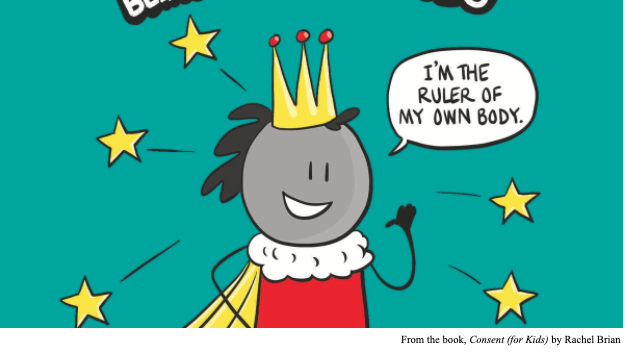By Eliza Sea
COURTESY OFFICE OF GOV. JAY INSLEE
I work in the world of education and consent is a practice that has somewhat recently become a living part of an everyday school environment. Learning to fluidly weave consent language throughout our days as educators to help inform and support body autonomy, personal space, respect for the environment, boundaries, and emotional expression has been a game changer in what the future looks like for young people. Gone are the days where it is acceptable for a child to be told to hug a stranger or apologize for a wrongdoing with physical contact - we have been teaching young people for too long that their bodies can be used and directed by others without the power of their own voices and choices.
I am continuously reminded that working with children and youth is a much easier task than grappling with big or controversial ideas with adults; speaking in the language of consent is rarely met with argument from youth.
Enter COVID.
From a new and refined practice of washing our hands to engaging in physical contact, COVID is teaching us how necessary it is to consider others’ personal space and bodies in a manner that is unapologetic and mandatory.
Consent language has always been a part of my practice as an educator and an aspect of education that is continuously needing to be addressed. Keeping our hands to ourselves can be challenging even as adults and children move through the world in tactile and experiential ways so it makes it even more vital that the adults are modeling and engaging in consent practices in all parts of life - school, home, public, private. For children to understand what consent looks like in real life, the adults must uphold the rules of engagement and actively participate in making consent a part of everyday processes in every environment – asking for physical contact, not taking up space that others are in, close proximity, addressing language that isn’t inclusive or appropriate, for example.
What has been most challenging is the entitlement that many individuals feel and how parallel teachings of shame need to accompany learning about consent. Decolonizing practices (continuous, necessary, lifelong) live in the dialogue about consent as the unpacking of ownership over one's body does not look the same for all individuals. In the colonial education system that I work within, the intersections of race, culture, histories, and geography all need to be addressed when educating about consent – intersectionality meaning in a manner that addresses the complex, cumulative ways that different identities and forms of discrimination combine, overlap, or intersect. (Adolescent Sexual Health Working Group, 2020.) Simply, intersectionality, on a basic level in the sexual education context, looks like using diverse resources where all kids can see a representation of themselves and/or their family, LGBTQIA+ / BIPOC representation, it means the adults need to be current with language and terms, porn literacy needs to be part of the conversation, consent always, and pleasure for all participants should be prioritized. Long gone are the days where youth should only be presented with the fear of reproduction – sex is so much more fun than that! Kids needs to have comprehensive education that continuously unpacks the interconnectedness of our world and that sex, while often turned into a taboo subject (typically made taboo by the awkward adults and in some contexts, socio- cultural conditioning), requires a multifaceted learning approach and is a necessary aspect understanding of self and moving through the world as a sexual being. Sex education has historically been about anatomical correctness, preventing pregnancy, fear mongering STI transmission, and in many places, abstinence; it has not discussed the complexities that intersectionality has on sexuality let alone the impact these have on individuals in their own sexual development.
Teaching sex ed is uncomfortable for many educators – a problem that deserves it’s own lengthy blog post – but COVID is helping to create an adjacent context of simply understanding the important practice of consent.
Resources for Parents
SOGI (Sexual Orientation and Gender Identity) / a progressive BC public education resource
https://www.sogieducation.org/parents
https://eca.state.gov/files/bureau/sogi_terminology.pdf
Planned Parenthood - a plethora of resources https://www.plannedparenthood.org/learn/parents/resources-parents
UK RSE (Relationships and Sex Education) Curriculum
https://www.bbc.co.uk/teach/relationships-and-sex-education-%28RSE%29-teaching-resources/z4pp7nb
Books / Websites / Videos
https://www.parents.com/kids/health/best-sex-education-books-for-kids-by-age/
Books Specifically About Consent
https://www.goodreads.com/list/show/128565.Children_s_Books_About_Consent
Resources Cited in This Post –
ASHWG. 2020. On The Importance Of Intersectionality In Sex Education | ASHWG. [online] Available at: <http://ashwg.org/2017/12/12/on-the-importance-of-intersectionality-in-sex-education/> [Accessed 20 November 2020].
Edited by Alex Whitman
New around here?
Check out all of our other trainings, programs, Certification program and community!
Trainings for everyone /Sexceptional Weekends,





